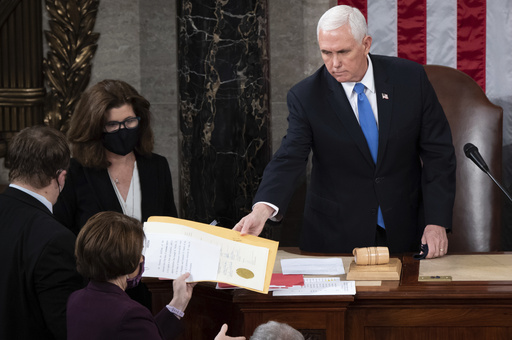
WASHINGTON — This upcoming presidential election marks the first since the insurrection at the Capitol on January 6, 2021, and is set to serve as a crucial test for the new safeguards and structures implemented by Congress. These measures aim to uphold the long-standing American tradition of a peaceful transition of presidential authority.
As Donald Trump, representing the Republican party, and Kamala Harris, the Democratic candidate, approach the culmination of their campaigns, advocates for democracy, as well as elected officials, are gearing up for a potentially tumultuous period following Election Day. This period could see legal disputes arise, the spread of misleading information, and a wait for Congress to validate the electoral outcomes.
Wendy Weiser, the vice president for democracy at the nonpartisan Brennan Center for Justice, pointed out that one of the unique aspects of this election is the heightened risks and threats directed toward the electoral system during the post-election phase. Following the disturbances of January 6, Congress made efforts to fortify the election process, aiming to prevent a repeat of that chaotic period when Trump and certain GOP allies refused to concede their defeat to President Joe Biden. Over several months, Trump attempted numerous unsuccessful legal maneuvers before rallying his supporters to the Capitol, leading to a violent disruption of the electoral count. The federal indictment he faces stems from this incident, which involved false electors from various states asserting a victory that never occurred.
While the recently passed Electoral Count Reform Act clarified processes for handling post-election disputes — including expediting legal resolutions and reinforcing that the vice president has no authority to alter the election outcome on January 6 — the new regulations are not foolproof. The effectiveness of these systems is heavily reliant on the actions of all parties involved: from the candidates to the elected officials and the citizens who must exhibit faith in a democratic system that has thrived for over two centuries.
Concerns about post-election unrest are palpable among voters. A recent poll indicates a significant level of anxiety regarding potential outcomes after the election cycle.
Dick Gephardt, former House leader and current member of the executive board of the nonpartisan organization Keep Our Republic, highlighted the group’s focus on providing civic education in key battleground states, including Michigan, Wisconsin, and Pennsylvania. “Our primary concern is whether Americans can continue to have genuine trust in the electoral process and whether we can ensure the peaceful transfer of power across all levels of government, particularly the presidency,” Gephardt stated in a briefing earlier this month, reflecting on the January 6th events as an eye-opener for many.
Democracy advocates also express alarm over the numerous legal challenges that have emerged, with many cases launched by both Democrats and Republicans even before Election Day. The volume of these disputes threatens to cast doubt on the election results and potentially fuel misinformation from both domestic and international sources, reminiscent of the spread of inaccurate claims by Trump’s legal team during the 2020 election.
As Trump campaigns to reclaim the presidency, he has already begun laying the groundwork for potential challenges, cautioning that this election may be “too big to rig.” The Republican National Committee has prioritized legal strategies in its Election Integrity initiatives. Within Congress, Trump finds support from allies like House Speaker Mike Johnson, who echoes concerns about election integrity by stating he would only accept the results of a free and fair election.
“We’re going to ensure a peaceful transition of power,” Johnson remarked on CBS, expressing confidence in Trump’s victory and the resolution of potential disputes. A specific narrative emerging from House Republicans suggests fears of illegal voting by noncitizens, contradicting evidence that underscores the rarity of such incidents, as confirmed by both state and federal audits. Johnson referenced a closely contested House race in Iowa from 2020 to back his claims.
Democratic Representative Joseph Morelle from New York expressed his concern that Johnson’s comments might reveal underlying strategies that Republicans may employ to challenge the election outcome, saying, “He’s unintentionally laying out their playbook.”
What happens in the time between the election and inauguration is crucial, with a series of deadlines established between Election Day on November 5 and Inauguration Day on January 20. States must confirm their electors by December 11 before the Electoral College convenes on December 17. The new Congress gathers on January 3 to elect its leadership, and by January 6, Congress will process the electoral counts — a usually ceremonial event overseen by the vice president.
In the wake of the January 6 events, the Electoral Count Reform Act introduced several modifications designed to strengthen the electoral process. These include quicker resolutions for legal disputes, ensuring that they are addressed before Congress reviews the results. Should any county decline to certify its results, governors now possess greater authority to finalize the state’s totals. Additionally, the law mandates that a minimum of 20% of both the House and Senate must support a challenge to a state’s electors for a vote to occur, a change from the previous requirement that permitted a single member from each chamber to demand a vote.
Representative Zoe Lofgren from California, a key player in crafting the new legislation alongside Republican Senator Susan Collins, stated that they did their utmost to safeguard the process. “People have the right to seek judicial recourse if they have grievances regarding the election, but once that process concludes, it should be final,” Lofgren concluded.
